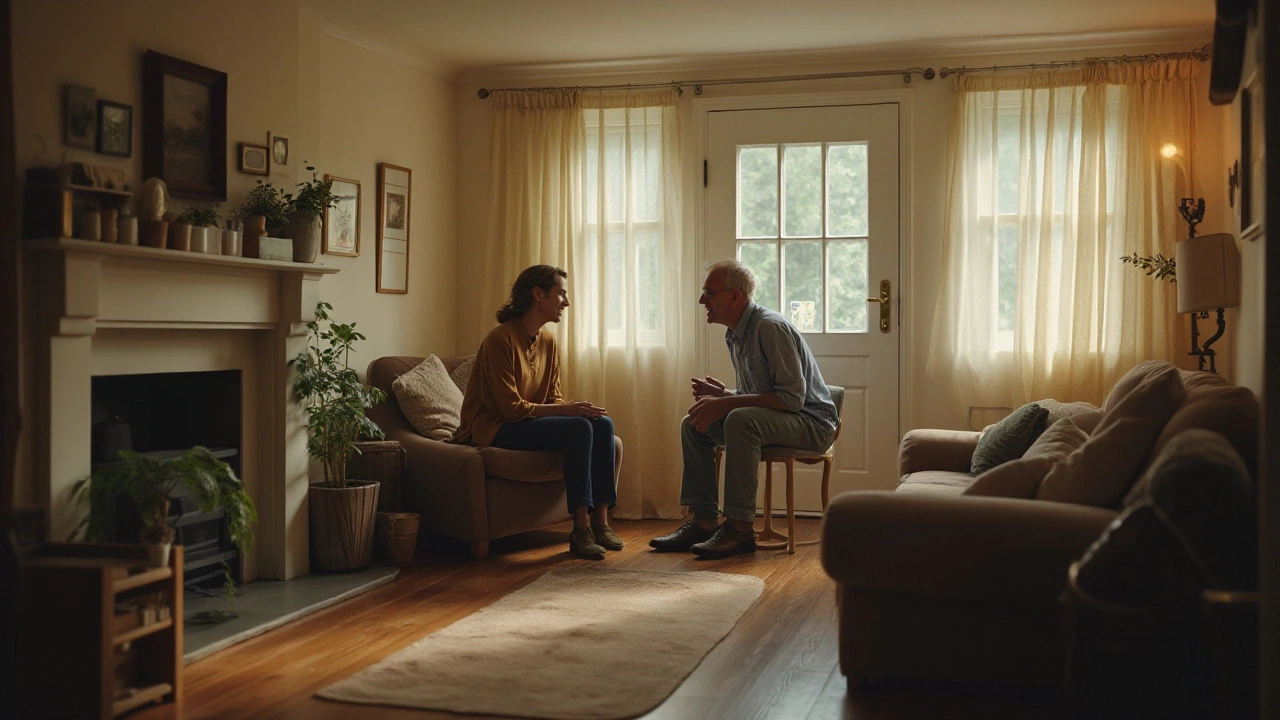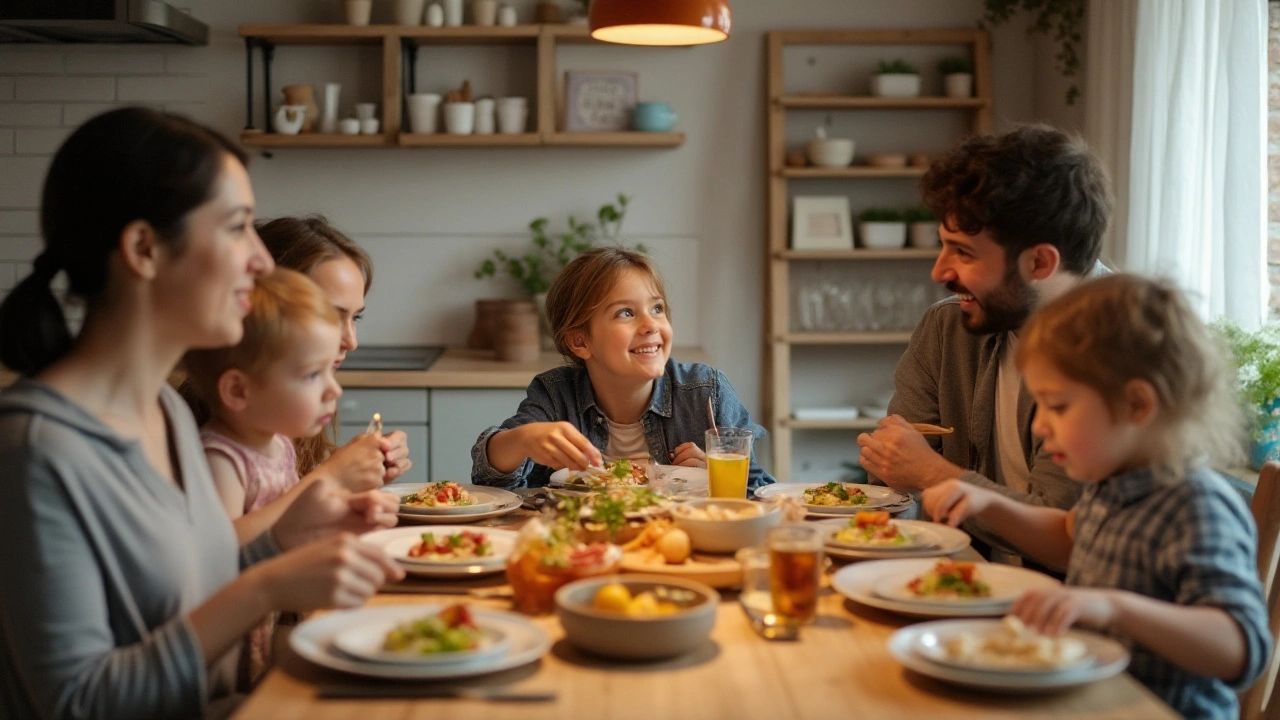Enhance Your Relationships Through Minimalism
 Nov, 9 2024
Nov, 9 2024
Minimalism often conjures images of tidy, white spaces, but its essence reaches beyond aesthetics into the realm of relationships. At its core, minimalism is about intentional living and focusing on what truly matters.
This philosophy, when applied to personal connections, can create deeper, more fulfilling bonds. As we extend minimalism to our interactions, we learn to cherish quality over quantity, making room for genuine understanding and appreciation.
Join us as we explore how applying minimalist principles to our relationships can pave the way for enriched connections, enhancing both our lives and those of the people we hold dear.
- Understanding Minimalism and Its Core Principles
- The Emotional Clutter That Impacts Relationships
- Prioritizing Relationships Through Minimalism
- How Simplifying Improves Communication
- The Ripple Effect: Shared Minimalist Values
- Practical Steps to Embrace Minimalism in Relationships
Understanding Minimalism and Its Core Principles
Minimalism, at its heart, is about removing the excess to make space for what truly matters in life, and it carries principles that can be transformative when applied broadly. Born out of a reaction to consumerism, minimalism shifts the focus from owning more to experiencing more. The idea is simple: by eliminating clutter, both physical and emotional, you are better positioned to engage meaningfully with the world around you. People often think of minimalism purely as getting rid of things, but it's more about intentionality. It's asking, ‘Does this add value to my life?’ and being brave enough to answer honestly.
This philosophy can easily be translated into our interactions and emotions, often cluttered by misunderstandings and superficial connections. Living minimally means prioritizing what enriches your life; this also includes relationships. By understanding minimalism as a tool for clarity and purpose, one can cultivate relationships that are healthier, more profound, and genuinely fulfilling. Psychologically, there's an effect known as the paradox of choice, where having too many options leads to stress and dissatisfaction. Minimalism curates your life, allowing you to concentrate better on fewer but more rewarding choices, thus making it easier to foster quality relationships.
Joshua Becker, author of The More of Less, says,
“Minimalism is the intentional promotion of the things we most value and the removal of anything that distracts us from it.”This concept encourages us to invest time and energy in what truly counts, like family and friends, instead of spreading ourselves thin. The practice involves not just cleaning out our closets but also our minds and hearts, using the gained space for meaningful interactions. It urges us to delve deeper rather than wider, choosing depth over breadth, thereby engaging in fewer conversations but far more significant ones.
Another crucial principle of minimalism is detachment, which doesn’t mean distancing from people but rather stepping back from the trivial stresses that can burden our interactions. By focusing on simplicity and essential values, we learn to disengage from drama and focus on the essence of the relationships that make life beautiful. Minimalism is not just a trend but a return to purposeful living in an age of information overload and constant distraction. By understanding and embracing its core principles, you begin to view every aspect of life, including relationships, through the lens of what they genuinely contribute to your experience of being human.
The Emotional Clutter That Impacts Relationships
In the hustle of modern living, our emotional lives often become tangled, mirroring the physical clutter that is common in many homes. This emotional clutter not only affects our personal well-being but spills over into our relationships, creating stress and disconnection. Emotional clutter refers to the unresolved feelings and thoughts that gnaw at our mind, pulling us away from the present. It includes things like past grudges, expectations unmet, and repetitive negative patterns that keep us from being fully available to others. These elements build walls around the heart, making open communication and true connection challenging.
Have you ever felt like conversations with a loved one are more about crossing each other in a corridor, rather than engaging meaningfully? Much of this stems from not addressing emotional clutter, which clogs our psyche just like needless objects fill a crowded room. As we hold on to emotional baggage, new misunderstandings accumulate, multiplying the distance between people who care for one another. Embracing minimalism in relationships involves confronting these emotional residues, choosing to either mend or let them go so we can make way for clarity and harmony.
Connection is key here. Only when we are untethered by past strains can we truly listen and respond. Psychologists often emphasize the need for detachment from emotional burdens for healthier interactions. According to Dr. Marie Kondo, similar to decluttering our homes, tidying our emotional baggage involves first acknowledging it, then assessing its relevance to the present relationship dynamic. Take, for example, the process of reconciling past misunderstandings—it requires courage to confront and sort through painful memories, but doing so opens up space for empathy and healing.
In this digital age, emotional clutter also arises from constant connectivity which ironically disconnects us from meaningful bonds. It’s crucial to filter out the noise, whether it’s incessant notifications or social media posts driving comparison, and focus on what's truly important in our lives. As such distractions are curbed, we can direct more energy towards nurturing genuine relationships. A minimalist lifestyle prompts a return to simpler, more honest forms of communication, where the focus shifts from the superficial to the substantial.
Consider a powerful statement by the esteemed psychiatrist and author, Elisabeth Kubler-Ross,
"The most beautiful people we have known are those who have known defeat, known suffering, known struggle, known loss, and have found their way out of the depths."This highlights the beauty of overcoming emotional clutter to find authentic human connections. Minimalism encourages this journey, guiding us to move beyond lingering pain and towards redemption within our relationships.
Recognizing emotional clutter is the first step in embracing a lifestyle of minimalism that benefits relationships. Tackling these issues might involve re-evaluating who and what we prioritize, and actively deciding which battles are worth fighting and which past issues are worth forgiving. By letting go of grievances and choosing to focus on love and understanding, relationships can transform from being a source of stress to a cornerstone of support and joy.

Prioritizing Relationships Through Minimalism
Embracing minimalism in our connections often begins with acknowledging what truly matters: genuine presence and intention. In a world bustling with notifications and never-ending to-do lists, people often find themselves feeling emotionally drained and disconnected from those they care about. By bringing a minimalist mindset to relationships, people can focus on creating meaningful experiences rather than virtual connections which often lack depth. This means intentionally choosing to spend quality time with fewer people but in a much richer way. The result is not a smaller circle, but a tighter bond with those who matter most.
When life becomes cluttered with commitments and the pursuit of material success, it can be easy to overlook the relationships needing care. Prioritizing relationships through a minimalist lens involves eliminating unnecessary distractions. This could mean turning off screen time during meals or reducing the number of social events attended just for the sake of appearances. Instead, it encourages going back to basics and investing time in activities that foster genuine conversation—like taking a walk in the park without the distraction of a phone, or sitting together to enjoy a quiet evening without an agenda. Such moments pave the way for deeper understanding and shared experiences that are often lost in the daily grind.
Minimalism paves a clear path towards better communication as it dispels emotional clutter. When you clear space in your mind and environment, you welcome the ability to listen actively and speak openly. This doesn't just build trust but also encourages emotional vulnerability, laying a foundation for stronger relationships. As oft quoted by Leo Babauta, an advocate for minimalism,
“The beauty of minimalism isn’t just its simplicity, but how it clears away the non-essential to make room for what’s most important.”Such a focus leads to fostering long-term, meaningful relationships rooted in mutual respect and shared values.
Bringing minimalism into your connections also guides you away from judgment and towards empathy. It encourages people to see each other beyond superficial layers defined by achievements or possessions. This perspective shift is invaluable in nurturing supportive networks where people feel seen and valued for who they are. In embracing simplicity, one embraces forgiveness and understanding, allowing relationships to thrive even in challenging times. This is about letting go of perfection and embracing authenticity, a vital element often cloaked in everyday life’s hustle.
The ripple effects of minimalism in relationships might extend to inspiring those around to appreciate quieter moments. Dinner conversations might become more engaging without electronic interruptions, lending themselves to a deeper appreciation of each other's ideas and experiences. While not every person will choose to follow the minimalist mantra, showing the benefits through action can be an inspiring force. Building these connections is about more than just removing physical clutter; it's about removing emotional barriers, allowing the space to nurture and grow. The result is a shared journey rooted in simplicity and connection—a life embraced with intention and purpose.
How Simplifying Improves Communication
When we talk about embracing minimalism, enhancing our relationships is a delightful outcome, especially in the realm of communication. By reducing the distraction and clutter, both physical and emotional, that often besiege our lives, we create space for effective and compassionate exchanges. This change starts with active listening, a cornerstone of impactful communication. In recent studies, it's found that over 70% of communication is misinterpreted because people listen to reply instead of understand. Thus, minimalism encourages us to truly focus on the words, emotions, and needs of those we care about, without our minds drifting to trivial matters.
Communication isn't just about what we say; it's about understanding and being understood. Imagine a conversation free from the burden of unnecessary complications where every word matters. Minimalism allows us to prune interactions to their essence, getting rid of habitual small talk that doesn't serve our true purpose. When you clear out verbal clutter, you make room for vulnerability and trust, essential elements in any strong relationship. This can be transformative, as everyone wants to be heard and validated, which is only possible when communication is simplified and sincere.
Effective communication benefits not only individuals but clearly enhances a group dynamic. According to a Harvard Business study, teams that communicate directly and avoid extraneous communication methods perform 30% better than those bogged down by excessive correspondence. Families and friends who adopt these principles often find themselves more connected and in tune with each other's needs. By simplifying how they communicate, they nurture a sense of belonging and mutual respect, which is not easily achieved when the dialogues are cluttered with unimportant details.
One significant practice that links minimalism to improved communication is digital detoxing. The omnipresent screens can be both a boon and a barrier in relationships. It's not uncommon to be in the same room as your loved ones but worlds apart due to digital distractions. By stepping back from digital engagement and being present with each other, we can engage in more meaningful conversations. This practice not only aids in reducing misunderstandings but also encourages a culture of communication where everyone feels heard and valued. Therefore, turning off phones or setting specific "no-tech" times can dramatically enhance family time and personal interactions.
In addition, minimalism invites reflection and mindfulness into our communication styles. By being mindful of our words and their potential impact, we naturally become more considerate. This consideration can significantly reduce conflicts that arise from misconstrued intentions. A space free of excess allows us to approach conversations with clarity and purpose. It presents an opportunity to express gratitude more frequently and deal with conflicts more constructively. These are not just abstract benefits but practical steps toward living a more fulfilling life with meaningful connections.
"The difference between successful people and really successful people is that really successful people say no to almost everything." - Warren Buffet
Moreover, practicing minimalism in communication doesn't imply saying less; it means saying what counts. This approach empowers individuals to say "no" tactfully when conversations do not align with their values or energy. It's about understanding the power of conversations and dedicating time to impactful discussion. Whether in personal life or professional settings, learning to simplify will streamline our interactions and truly enhance our connections.

The Ripple Effect: Shared Minimalist Values
When two individuals embrace minimalism in their lives, it creates a common ground that can deepen connections. This shared philosophy encourages a shift in mindset—from a focus on material possessions to one that values meaningful experiences and relationships. As both parties start valuing simplicity, it fosters harmony. This is because they are both reducing distractions, making space for each other to grow together. As they adopt minimalism, they tend to find joy in small, everyday moments, which strengthens their bond.
One significant benefit of this shared journey is the emphasis placed on what truly matters. With less time spent on acquiring and maintaining possessions, there's more time available for experiencing life and enriching relationships. Couples often find new, unanticipated joy in simply being together without external clutter or distractions. Embracing this simplicity revamps priorities, highlighting a need for mutual support, understanding, and communication. It becomes easier to foster an environment where each person's thoughts and feelings are valued, enhancing empathy and intimacy.
"When you have less, you appreciate more. The most simple things become your richest experiences. Relationships included." – Francine Jay, author of The Joy of Less.
Beyond the emotional benefits, shared minimalist values can also translate into practical improvements in daily life. Financial stress, for example, is alleviated as both partners agree on a simplified lifestyle that doesn't prioritize excessive spending. They can allocate resources towards travel, hobbies, or investments that enhance their lives and relationship instead. A shared minimalist philosophy can even bolster environmental consciousness, as those who consume less tend to produce less waste, leaping into a lifestyle that benefits both themselves and the planet.
Socially, pursuing minimalism together may influence friends and family, encouraging others to reconsider their priorities too. It serves as a statement of values, inspiring others to question the conventional consumer-driven mindset. The positive changes in your relationship could inspire those close to you, creating a domino effect where shared values expand beyond immediate surroundings. In essence, embracing simplicity as a couple not only strengthens individual connections but also potentially enriches the broader community.
| Category | Benefits |
|---|---|
| Emotional | Improved understanding, empathy, and intimacy. |
| Practical | Reduced financial stress and better resource allocation. |
| Social | Positive influence on friends and family. |
By incorporating minimalism into their joint values, couples don’t just simplify their physical spaces, they simplify and enrich their lives. It's a pathway to not just coexist, but truly thrive together, redefining what it means to share a life. As these principles permeate their relationship, the effects ripple outwards, touching every facet of their shared journey and potentially those of others around them.
Practical Steps to Embrace Minimalism in Relationships
Adopting a minimalist lifestyle can have a profound impact on your personal connections, turning them into sources of joy and support. To practice minimalism in relationships, the first and perhaps most crucial step is open communication. This involves more than simply talking; it requires truly listening and engaging with your partner or loved one. By reducing distractions, you create an environment where meaningful conversations can flourish, leading to improved understanding and a stronger bond. Consider scheduling regular 'tech-free' time, where gadgets are set aside in favor of one-on-one interaction. Such intentional practices help prioritize the very essence of human connection.
Another significant step is decluttering your emotional baggage. Often, relationships suffer not because of external factors but due to unresolved past issues and emotional clutter. It's about understanding what holds value and what can be let go. This process might involve seeking closure from past grievances or simply recognizing your own emotional triggers. As you free your mind from unnecessary weight, you create space for empathy and trust to grow. Journaling or talking with a counselor can facilitate this process, offering clarity and a sense of freedom.
Emphasizing quality time over quantity also plays a crucial role in adopting minimalism. The idea is to focus on the depth of your interactions rather than the frequency. Appreciate the present by planning activities that encourage interaction, such as hiking in nature or cooking a meal together. These experiences foster genuine connection without the pressure of excess, enabling both parties to appreciate the time spent together more deeply. Minimalist activities often require little in terms of resources, yet they offer rich rewards in connection.
Aligning shared values and goals is another practical method of incorporating minimalism into relationships. Discuss and reflect on what simplifies and enriches both your lives. This synergy can lead to more coherent decision-making, ensuring both partners are moving forward together rather than apart. For instance, deciding on shared financial goals or lifestyle choices can unify efforts and reduce stress. Agreements on what truly matters bring coherence and direction to your relationship.
Adopt small rituals that strengthen your bond with minimal effort. Whether it's a regular evening stroll, a shared journal, or setting aside time for a weekly reflection, these rituals reaffirm your commitment to one another. They're simple yet deeply fulfilling, providing a structure within which your relationship can blossom without the noise of the outside world.
Finally, remember that minimalism is a journey, not a destination. It's about making conscious choices every day to live more meaningfully. Embrace the lessons along the way, and be patient with yourself and others as you navigate this path.
"In a world full of distractions, simplicity brings clarity and peace to the heart." — Joshua Becker